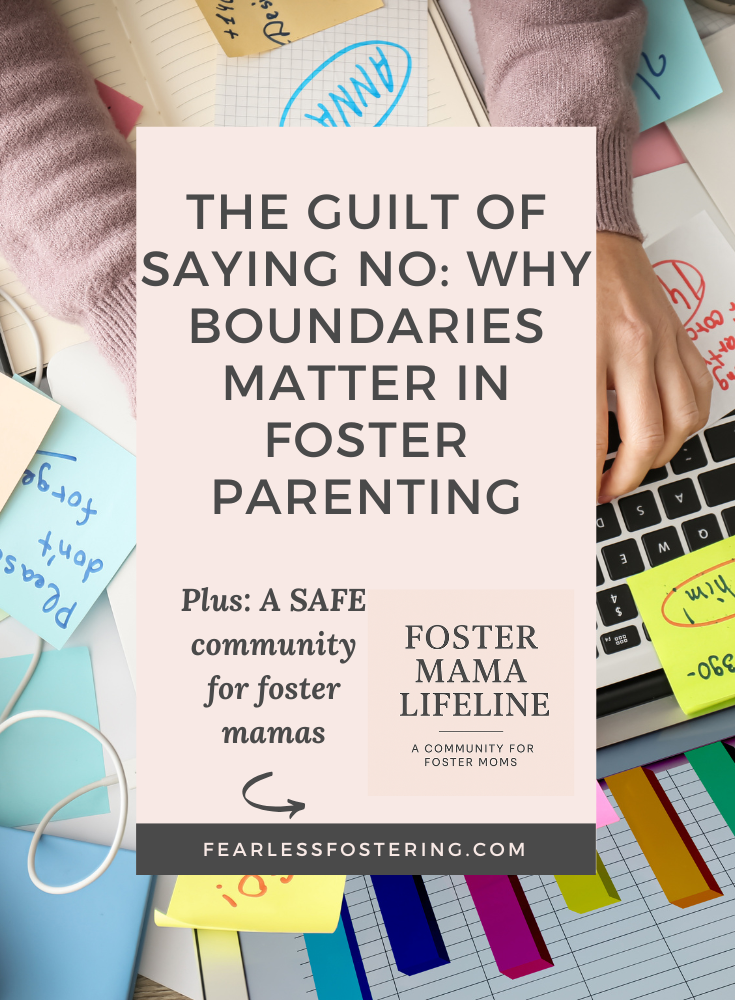
If there’s one word I hear over and over again from foster moms, it’s this: guilt.
We feel guilty for not doing enough, for not being enough, for wanting rest, for saying no to one more visit, one more placement, one more request from a caseworker. And when we do say no, we often sit with the heavy weight of second-guessing ourselves: Am I letting someone down? Am I failing as a foster parent?
But here’s the truth: boundaries are not selfish — they are essential. Without them, foster parenting will eat us alive. With them, we can actually show up more fully, more consistently, and more lovingly for the children in our care.
Why Foster Moms Struggle to Say No
Foster parenting is unique in so many ways. Unlike biological parenting, there are constant outside voices and pressures shaping our day-to-day lives: caseworkers, judges, therapists, agency rules, biological families, and the system itself.
And because we know these children have already been through so much, we want to say yes to everything — more visits, more services, more flexibility, more placements. Saying yes feels like love, like sacrifice, like the “right” thing to do.
But here’s the catch: when every yes is at our expense, no one wins.
-
Kids can sense our burnout.
-
Relationships with our partners and other children get strained.
-
We become resentful instead of present.
What looks like love on the surface can actually erode our ability to sustain this journey long term.
Why Boundaries Are Not Selfish
Think of boundaries like guardrails on a highway. They’re not there to block the journey — they’re there to keep everyone safe.
Boundaries in foster parenting might sound like:
-
Saying no to a placement that doesn’t fit your family’s capacity right now.
-
Asking for notice before visits instead of last-minute disruptions.
-
Protecting certain family rhythms (like dinner time or bedtime) as non-negotiable.
-
Taking respite when you need it, without apology.
None of these make you a “bad” foster parent. In fact, they make you a sustainable one. Because here’s the truth: burned-out moms can’t pour into their kids the way they want to. Boundaries protect not just you — but the children in your care.
The Role of Guilt
So why does it feel so terrible to say no? Guilt.
Guilt tells us:
-
“If you say no, you’re letting everyone down.”
-
“If you set limits, you’re not a good enough mom.”
-
“If you take care of yourself, you’re selfish.”
But here’s the truth: guilt is a signal, not a fact. It often shows up when we’re doing something new, like setting a boundary. Over time, the guilt fades — and peace, presence, and stability take its place.
How to Set Boundaries Without Losing Compassion
Setting boundaries doesn’t mean slamming doors or refusing to collaborate. It’s about knowing your limits and communicating them with kindness.
Here are some strategies:
1. Get Clear on Your Non-Negotiables
Write down the top 3 things your family needs to thrive — maybe it’s bedtime routines, Sunday family time, or not taking more than 2 placements at once. Protect those first.
2. Pause Before Answering
When a request comes in, practice saying: “Let me think about that and get back to you.” It gives you space to respond, not react.
3. Use Gentle but Firm Language
-
Instead of: “We can’t ever do that.”
-
Try: “Right now, that doesn’t work for our family. Here’s what we can do instead.”
4. Remind Yourself: Saying No Creates Space for Your Best Yes
Every no frees you to say yes to the things that matter most — the children already in your care, your own health, and your family’s stability.
Real-Life Examples
One foster mom in our community shared how she used to say yes to every placement call, even though her family was stretched thin. Eventually, the stress nearly broke her marriage. Learning to say, “We’re not available right now,” felt excruciating at first — but it preserved her family so they could continue fostering long-term.
Another mama realized she had said yes to last-minute visit changes so often that her other children were beginning to resent the constant disruption. Setting a boundary with the caseworker felt terrifying — but ultimately created more stability for all the kids in her home.
These stories remind us: boundaries don’t shut doors, they open the right ones.
Final Encouragement
If you feel guilty for saying no, you’re not alone. Every foster mom wrestles with this. But here’s what I want you to remember:
-
Saying no doesn’t make you selfish. It makes you sustainable.
-
Boundaries are not walls — they’re bridges that help you love from a place of strength.
-
The children in your care don’t need a perfect foster mom. They need a present one.
So the next time guilt creeps in when you set a boundary, remind yourself: I am not failing. I am protecting the space where healing can actually happen.
Call to Action
If this resonated with you, I want you to know — you don’t have to navigate the guilt and the boundaries alone.
Inside the Foster Mama Lifeline, we talk about real-life struggles like this every month. You’ll find community, encouragement, and practical tools to help you set boundaries without the guilt.
💛 Join us for just $129/year and get instant access to the support you’ve been craving.
+ show Comments
- Hide Comments
add a comment